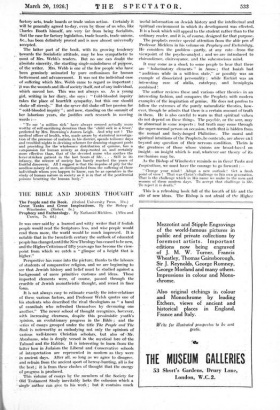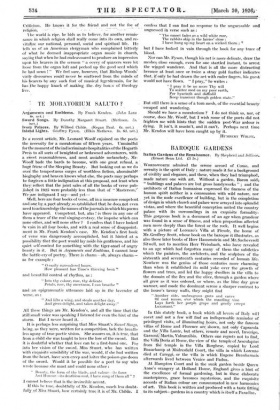THE BIBLE . AND 310-DERN - THOUGHT
IT was once said by a learned and witty writer that if foolish people would read the Scriptures less, and wise people would read them more, the world would-lie much improved. It is notable that in the twentieth century the outlook of educated
- people has changed,until the New Theology has ceased to be new, and the Higher Criticism of fifty years ago has become the view- point from which we catch a " glimpse of a height that is higher." 'Perspective has come into the picture, thanks to the labours
of students of comparative religion, and we are beginning to see that Jewish history and belief must be studied against a background of more primitive customs and ideas. These imported elements were, of course, passed through the Crucible of- Jewish monotheistic thought, and recast in finer
form.
It is not always easy to estimate exactly the inter-relations of these various factors, and Professor Welsh quotei one of
• his students whb described the theologians as " a band of cannibals who refreshed themselves by devouring one another." The newer school of thought recognizes; however, - with increasing clearness, despite this pessimistic youth's opinion, an evolutionary progress in the Bible ; and the series of essays grouped under the title The People and The Rook is. noteworthy .as embodying not only the opinion§ of Various well-known Christian scholars, but also of ,,Mr. Abrahams,. who is deeply versed in the mystical lore -uP the Talmud and the Rabbis: It is interesting to learn .from'the latter how in JUdaism the Liberal and - Conservative schools of interpretation are represented in modern as they were
' in anoient days. After all, so long as we agree to disagree, and refrain from the ancient sport of heresy-hunting, all is for the best ; it is 'from these clashes of thought that the energy of progress is produced.
This volume of essays by the members of the Society for
'- Old- Testament Study inevitably lacks the cohesion which a -single' author can give to his work ; but • it-contains much -useful information on Jewish history and the intellectual and spiritual environment in which its development was effected. It is a book which will appeal to the student rather than to the ordinary.reacler, and it is, of course, designed for that purpose.
The prophets. receive special attention from the able pen of Professor Micklem in his volume on Prophecy and Eschatology. He considers the problem—partly, at any rate—from the viewpoint. of the psycho-analyst.; and we are introduced to clairaudience, clairvoyance, and the subconscious mind.
It may come as a shock to some people to hear that there arc " halucinatory elements in Amos ; that Isaiah had " auditions while in a will-less. state," or possibly was an example of dissociated personality ; while Ezekiel was an interesting case . of . alalia, catalepsy, and . hemiplegia .combined !
The author reviews these and various other theories in an interesting fashion, and compares the Prophets with modern examples of the inspiration of.genius. He does not.profess to follow the extremes of the purely naturalistic theories, how- ever, though he admits that there is a certain amount of truth in them. He is also careful to warn us that spiritual values do not depend on these things. The psychic, .or the seer, may be abnormal in some respects ; but truth may come through the super-normal person' on occasion; truth that is hidden from the normal and lusty-lunged Philistine.- , The moral . and - spiritual intuitions of.the Prophets, he contends, are anove ani beyond any question of their nervous condition. Theirs is the greatness of those whose visions are broad-basal on insight—an insight which is real, whatever our theory of its mechanism may be. .
As the Bishop of Winchester reminds us in Great. Tasks and Inspirations, we must have the courage to go forward :--
_ ". Change your mind ! Adopt a new outlook ! Get a fresh point of view ! That was Christ's challenge to His own generation. That is the challenge which in His name we make to the men and women of these modern days. • To accept that challenge is life.
To reject it is death." _ -
This is a refreshing book full of the breath of life and the stir of new 'ideas. The Bishop is not afraid of the Higher Criticism. He knows it for the friend and not the foe of ' religion.
he world is ripe, he bids us to believe, for another renais- sanec in which religion shall really come into its own, and re- vitalize our national, personal, social and spiritual life. He tells -us of an American clergyman who complained bitterly of what he deemed inappropriate organ music in church, saying that when he had endeavoured to produce an impression upoh his hearers in the sermon " a covey of quavers were let loose from the organ loft and pecked up the good seed which he had sown ! " We feel sure, however, that Bishop Woods' virile discourses could' never be scattered from the minds of his hearers by any suck feat of musical legerdemain, for he has the happy knack of making Ihe_ dry bones of theology live.



























































 Previous page
Previous page